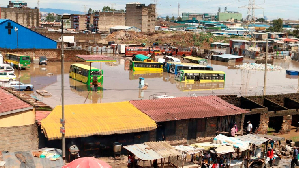- Home - News
- TWI News | TV
- Polls
- Year In Review
- News Archive
- Crime & Punishment
- Politics
- Regional
- Editorial
- Health
- Ghanaians Abroad
- Tabloid
- Africa
- Religion
- Election 2020
- Coronavirus
- News Videos | TV
- Photo Archives
- News Headlines
- Press Release
General News of Tuesday, 22 April 2003
Source: nbsp;
NPP To Discipline "Rebel" MPs
For the first time since it came to power, the NPP is going to apply its Parliamentary whip against some of its members in Parliament. In what could be described as a stab at the back, some NPP members of Parliament absented themselves when their votes were needed most for a crucial government vote last week.
At about 10.30 am when the outgoing Acting Interior Minister, Dr Kwame Addo Kufuor entered the floor of Parliament to move for the extension of the State of Emergency in Dagbon state, little did he know that it was not going to be as smooth sailing as he had enjoyed on previous occasions.
After a heated debate from both sides, the Second Deputy Speaker, Ken Dzirasah who was in the chair moved for the adoption of the motion, but to the surprise of the majority leadership, the motion could not go through. Even though the majority had 88 as against 73 by the minority, they could not marshal the required 101 votes to carry the day. The NPP currently has 102 MPs.
It was clear on the faces Dr Addo Kufuor and Papa Owusu Ankomah that they had been let down by their own men. When Papa Owusu Ankomah?s attention was drawn to the fact that at the time the motion was being carried through, some NPP members were at the lobby, he expressed shock. He promised to institute investigations into the conduct of the ''rebel'' NPP MPs saying the necessary sanction would be applied.
Papa Owusu Ankomah described the Minority?s disapproval as an attempt to flex its muscles against the backgrounf of electoral defeats it has suffered in recent by-elections.
But Minority Chief Whip, Doe Adjaho denied that the Minority was trying to make political capital out of the Dagbon crisis. He said since the violence erupted, the Minority has sent a number of delegations at its own expense to Dagbon to try to broker peace between the disputing parties.
Mr Adjaho said if government has admitted that the feuding parties had agreed to renounce violence, then there was no justification for the continued retention of the State of Emergency, which had negatively affected both the economic and political activities in the area.
Opinions









